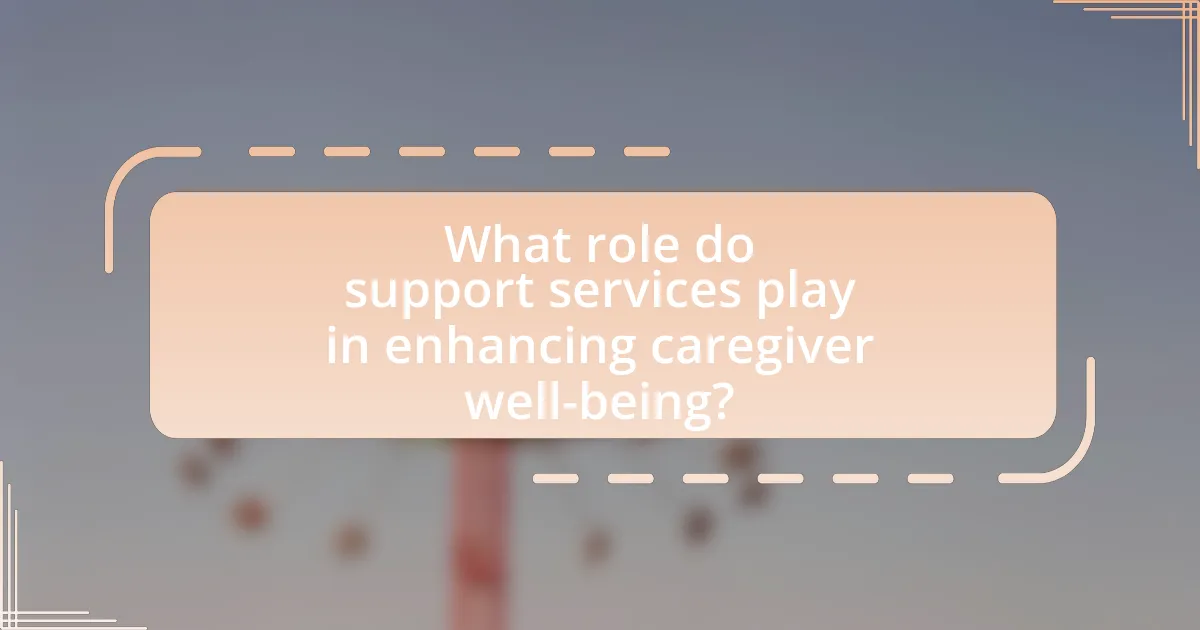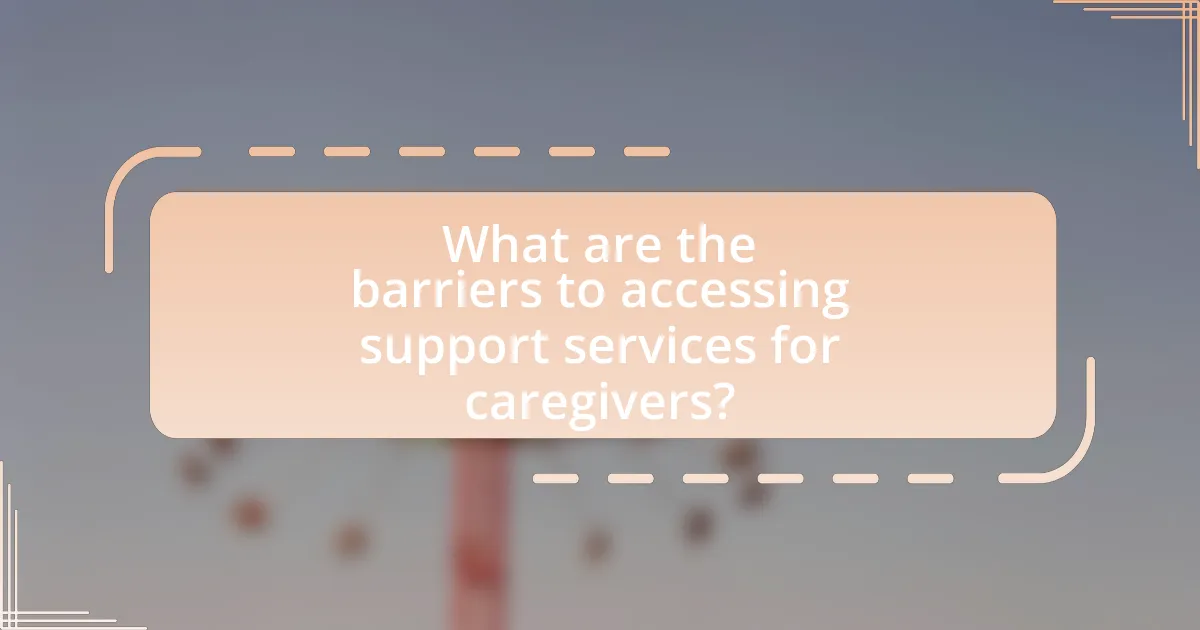The article focuses on the significance of creating awareness about caregiver well-being and the impact of support services on their mental and physical health. It highlights the high levels of stress, anxiety, and depression experienced by caregivers and emphasizes the importance of support services such as respite care, counseling, and support groups in alleviating caregiver burden. The article discusses how these services enhance caregiver well-being, improve the quality of care provided, and address unique challenges faced by caregivers. Additionally, it explores barriers to accessing support services and offers strategies for caregivers to advocate for themselves and effectively utilize available resources.

What is the significance of creating awareness about caregiver well-being?
Creating awareness about caregiver well-being is significant because it directly impacts the mental and physical health of caregivers, which in turn affects the quality of care they provide. Research indicates that caregivers often experience high levels of stress, anxiety, and depression, with studies showing that approximately 40-70% of family caregivers report clinically significant symptoms of depression. By raising awareness, communities can foster support systems that alleviate caregiver burden, promote self-care, and enhance overall well-being. This awareness can lead to increased access to resources, such as counseling and respite care, which are essential for maintaining caregiver health and ensuring sustainable caregiving practices.
How do support services influence caregiver mental health?
Support services significantly enhance caregiver mental health by providing emotional support, practical assistance, and resources that reduce stress and prevent burnout. Research indicates that caregivers who utilize support services report lower levels of anxiety and depression, as these services offer a network of understanding individuals and access to coping strategies. For instance, a study published in the Journal of Gerontological Nursing found that caregivers who participated in support groups experienced a 30% reduction in depressive symptoms compared to those who did not engage in such services. This evidence underscores the critical role that support services play in promoting the mental well-being of caregivers.
What specific support services are available for caregivers?
Specific support services available for caregivers include respite care, counseling services, support groups, educational resources, and financial assistance programs. Respite care provides temporary relief for caregivers, allowing them to take breaks while ensuring their loved ones receive care. Counseling services offer emotional support and coping strategies for the stress associated with caregiving. Support groups facilitate connections among caregivers, fostering shared experiences and advice. Educational resources equip caregivers with knowledge about medical conditions and caregiving techniques. Financial assistance programs help alleviate the economic burden of caregiving, providing funds for necessary services or equipment. These services collectively enhance caregiver well-being by reducing stress and improving access to necessary resources.
How do these services address the unique challenges faced by caregivers?
Support services address the unique challenges faced by caregivers by providing essential resources, emotional support, and practical assistance. These services help alleviate caregiver stress, which is often exacerbated by feelings of isolation and burnout. For instance, respite care allows caregivers to take necessary breaks, reducing fatigue and improving overall mental health. Additionally, support groups offer a platform for caregivers to share experiences and coping strategies, fostering a sense of community. Research indicates that caregivers who utilize support services report lower levels of stress and improved well-being, highlighting the effectiveness of these interventions in addressing their specific needs.
Why is caregiver well-being essential for effective caregiving?
Caregiver well-being is essential for effective caregiving because it directly influences the quality of care provided to individuals in need. When caregivers experience high levels of stress, burnout, or emotional distress, their ability to perform caregiving tasks diminishes, leading to poorer outcomes for those they care for. Research indicates that caregivers who maintain their well-being are more likely to engage positively with their care recipients, resulting in enhanced emotional and physical health for both parties. For instance, a study published in the Journal of Gerontological Nursing found that caregivers who received adequate support and resources reported lower levels of stress and higher satisfaction in their caregiving roles, which in turn improved the overall care experience for their loved ones.
What are the consequences of neglecting caregiver well-being?
Neglecting caregiver well-being leads to increased stress, burnout, and negative health outcomes. Caregivers who do not prioritize their own mental and physical health may experience chronic fatigue, anxiety, and depression, which can impair their ability to provide effective care. Research indicates that caregivers are at a higher risk for developing health issues, with studies showing that 40-70% of caregivers report significant stress and related health problems. This decline in well-being not only affects the caregivers themselves but also compromises the quality of care they provide, potentially leading to poorer outcomes for those they support.
How does caregiver well-being impact the care recipient?
Caregiver well-being significantly impacts the care recipient’s health and quality of life. When caregivers experience high levels of stress, burnout, or poor mental health, the care they provide may become less effective, leading to negative outcomes for the recipient, such as increased anxiety, depression, and physical health decline. Research indicates that caregivers who receive adequate support and maintain their well-being are more likely to provide compassionate and attentive care, which directly correlates with improved emotional and physical health for the care recipient. For instance, a study published in the Journal of Gerontology found that care recipients of well-supported caregivers reported higher satisfaction and better health outcomes compared to those cared for by stressed caregivers.

What role do support services play in enhancing caregiver well-being?
Support services play a crucial role in enhancing caregiver well-being by providing essential resources, emotional support, and respite opportunities. These services, such as counseling, support groups, and educational programs, help caregivers manage stress, reduce feelings of isolation, and improve their coping skills. Research indicates that caregivers who utilize support services report lower levels of depression and anxiety, leading to better overall health outcomes. For instance, a study published in the Journal of Gerontological Nursing found that caregivers who participated in support groups experienced significant improvements in mental health and life satisfaction.
How can awareness of support services be improved among caregivers?
Awareness of support services among caregivers can be improved through targeted outreach and education initiatives. These initiatives can include workshops, informational sessions, and the distribution of educational materials that highlight available resources. Research indicates that caregivers who receive information about support services are more likely to utilize them; for instance, a study published in the Journal of Family Nursing found that structured educational programs significantly increased caregivers’ knowledge and usage of support services. Additionally, leveraging digital platforms and social media can enhance visibility and accessibility of these services, reaching a broader audience effectively.
What strategies can organizations implement to raise awareness?
Organizations can implement strategies such as targeted social media campaigns, community outreach programs, and partnerships with local influencers to raise awareness. Targeted social media campaigns can effectively reach specific demographics, as studies show that 72% of the public uses social media to connect with brands. Community outreach programs allow organizations to engage directly with caregivers, providing them with information and resources that can enhance their well-being. Additionally, partnerships with local influencers can amplify messages, leveraging their credibility to reach wider audiences. These strategies collectively enhance visibility and understanding of caregiver support services, ultimately improving caregiver well-being.
How can caregivers advocate for themselves in accessing support services?
Caregivers can advocate for themselves in accessing support services by clearly communicating their needs and rights to service providers. This involves researching available resources, understanding eligibility criteria, and actively participating in discussions about their care requirements. For instance, caregivers can join support groups or networks that provide information on services and share experiences, which can empower them to negotiate better access to necessary support. Studies indicate that caregivers who engage in advocacy are more likely to receive adequate resources, as highlighted in the research by the National Alliance for Caregiving, which emphasizes the importance of self-advocacy in improving caregiver well-being.
What types of support services are most effective for caregivers?
Respite care services are among the most effective support services for caregivers, as they provide temporary relief from caregiving responsibilities. Research indicates that respite care can significantly reduce caregiver stress and improve overall well-being. A study published in the Journal of the American Geriatrics Society found that caregivers who utilized respite services reported lower levels of depression and anxiety, highlighting the positive impact of such support on mental health. Additionally, support groups and counseling services also play a crucial role by offering emotional support and practical advice, further enhancing caregivers’ coping strategies and resilience.
How do peer support groups benefit caregivers?
Peer support groups benefit caregivers by providing emotional support, practical advice, and a sense of community. These groups allow caregivers to share experiences and challenges, which can reduce feelings of isolation and stress. Research indicates that participation in peer support groups can lead to improved mental health outcomes, such as decreased anxiety and depression levels among caregivers. A study published in the Journal of Gerontological Nursing found that caregivers who engaged in peer support reported higher levels of satisfaction and lower levels of caregiver burden, demonstrating the tangible benefits of these support networks.
What role does respite care play in caregiver well-being?
Respite care significantly enhances caregiver well-being by providing temporary relief from caregiving responsibilities. This relief allows caregivers to recharge, reducing stress and preventing burnout, which is crucial given that approximately 40% of family caregivers report high levels of emotional stress. Studies indicate that regular access to respite care can lead to improved mental health outcomes for caregivers, including lower rates of depression and anxiety. Furthermore, respite care enables caregivers to maintain their own health and social connections, which are essential for long-term sustainability in their caregiving roles.

What are the barriers to accessing support services for caregivers?
Barriers to accessing support services for caregivers include lack of awareness, financial constraints, and limited availability of services. Many caregivers are unaware of the resources available to them, which can lead to underutilization of support services. Financial constraints often prevent caregivers from seeking help, as they may not have the means to pay for services or may fear losing income. Additionally, limited availability of services, particularly in rural areas, restricts access to necessary support. According to a study published in the Journal of Family Issues, 40% of caregivers reported that they could not find adequate services in their area, highlighting the significant challenges faced in accessing support.
How do financial constraints affect caregiver access to support services?
Financial constraints significantly limit caregiver access to support services by reducing their ability to afford necessary resources. Caregivers often face high out-of-pocket costs for services such as respite care, counseling, and training programs, which can lead to decreased utilization of these essential supports. According to a study published in the Journal of Aging & Social Policy, nearly 60% of family caregivers reported that financial limitations hindered their ability to seek help, resulting in increased stress and burnout. This financial barrier not only affects the quality of care provided but also impacts the overall well-being of caregivers, as they may forgo necessary support due to cost concerns.
What funding options are available for caregivers seeking support?
Caregivers seeking support have several funding options available, including government programs, grants, and nonprofit assistance. Government programs such as Medicaid and the Veterans Administration provide financial support for eligible caregivers. Additionally, various grants are offered by organizations like the National Family Caregiver Support Program, which allocates funds specifically for caregiver services. Nonprofit organizations, such as the Caregiver Action Network, also provide resources and financial assistance to help caregivers manage their responsibilities. These funding options are designed to alleviate the financial burden on caregivers and enhance their well-being.
How can caregivers overcome logistical challenges in accessing services?
Caregivers can overcome logistical challenges in accessing services by utilizing technology and community resources effectively. For instance, telehealth services allow caregivers to connect with healthcare providers remotely, reducing travel time and associated costs. Additionally, local organizations often provide transportation assistance or coordinate service delivery, which can alleviate barriers related to mobility. Research indicates that caregivers who leverage these resources report improved access to necessary services, enhancing their overall well-being and reducing stress associated with caregiving responsibilities.
What are the best practices for caregivers to utilize support services effectively?
Caregivers can utilize support services effectively by actively seeking out resources, establishing clear communication with service providers, and regularly assessing their own needs. Actively seeking resources involves researching local and online support services, such as respite care, counseling, and support groups, which can provide essential assistance. Establishing clear communication with service providers ensures that caregivers understand the services available and can articulate their specific needs, leading to tailored support. Regularly assessing their own needs allows caregivers to identify when they require additional help, ensuring they do not become overwhelmed. These practices are supported by studies indicating that caregivers who engage with support services report lower levels of stress and improved well-being, highlighting the importance of effective utilization of available resources.
How can caregivers identify the right support services for their needs?
Caregivers can identify the right support services for their needs by assessing their specific challenges and requirements, then researching available resources that address those needs. This involves evaluating personal circumstances, such as the type of care required, the caregiver’s own health, and available time, which helps in pinpointing the most relevant services. For instance, caregivers may benefit from respite care, counseling, or support groups, depending on their situation. Research indicates that caregivers who utilize tailored support services report improved well-being and reduced stress levels, highlighting the importance of matching services to individual needs.
What tips can caregivers follow to maximize the benefits of support services?
Caregivers can maximize the benefits of support services by actively engaging with available resources, such as attending workshops and support groups. Engaging with these services allows caregivers to gain valuable insights, share experiences, and receive emotional support, which has been shown to reduce stress and improve overall well-being. Research indicates that caregivers who participate in support services report higher levels of satisfaction and lower levels of burnout, highlighting the importance of utilizing these resources effectively.